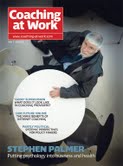Welcome to the October 2012 issue of the newsletterI’m filing this newsletter from Kansas University’s Global Summit on Coaching, in Lawrence. The town was established in 1854 by anti-slavery advocates and saw much bloodshed when it became a target for the nearby Missouri-based pro-slavery faction. Campaigning for change runs deep in its veins. And today too, Lawrence is a site for innovation. The Kansas Coaching Project, headed up by Jim Knight, has pioneered ‘instructional coaching’ (IC) in the field of education. Described as “on-site professional developers who teach educators how to use proven instructional methods,” Knight admits instructional coaches are more like consultants but they are also encouraged to learn from and draw on coaching approaches and techniques. Around 240 of them have gathered here to do just that, flocking to sessions on ‘aha’ moments, the GROW model, Positive Psychology and mindfulness (which I presented on). Developing teachers-as-coaches has been a topic of conversation at the conference too. And I was chatting to a fellow presenter, Kieran Gordon, CEO for Greater Merseyside Connexions (which provides careers guidance for people in the North West of England) about how its front-line careers advisors are now acting like coaches. The ‘informed adaptive’ approach Knight recommends is one we’re seeing more and more, which I welcome. When I was asked along with other presenters what I was taking away from the conference, it was not to be too snooty about purist non-directive coaching being the best approach. Talking of innovation and creativity, Brené Brown- who spoke at the global International Coach Federation conference earlier this month- reminds us that we can’t have these without vulnerability. And she somewhat controversially said that coaching in which shame wasn’t talked about probably wasn’t going deep enough (see online news, give shame a voice AND embrace your vulnerability. We have a fascinating thread on “Should we address shame in our coaching?” currently being discussed in our LinkedIn group (to join, see below). We’ve had some very interesting contributions already but would love to hear your thoughts too. We ran an article on a shame a while back too by Marion Gillie called red alert. In the November issue of the magazine, we feature a full ICF conference report. It’s the lead-up to the US election as I write this, and it’s been interesting watching the coverage here in the States. I wonder how much, if any, coaching is going on behind the scenes- certainly Obama was holed up in a pre-election ‘speed debate boot camp’ after a lacklustre performance in Dallas and he’s upped his game as a consequence. We feature an excellent article on coaching in politics by a coach and political adviser at the European Parliament in the November issue of the magazine (subscribers only: running mate.) Our own conference is on 2 July 2013 in London. Subscribers are eligible for a discount to this and all our events (the last two conferences sold out weeks before). In addition, subscribers receive either both the digital magazine, or the printed and the digital version of the magazine. We publish six magazine issues a year; 16 newsletters (including four mentoring digests) and subscription also includes registration on our global Coach List; additional online content; access to every issue since 2005, and a global LinkedIn group (at last count we had around 12,000 members). See a sample issue here Liz Hall, Editor, Coaching at Work, Winner of the Association for Coaching Award for Impacting (Leadership/External Focus) Service to the Wider Community for 2010–11
Let’s get connectedFollow us on Twitter athttp://twitter.com/CoachatWorkmag http://twitter.com/lizhallcoaching Join our global Coaching at Work Linkedin group athttp://www.linkedin.com/groups?mostPopular=&gid=2274910 Coach listHave you joined our coach list yet? or if you’re a buyer, have you used the list to help you find the coach/coaches you need? you can now upload a coaching at work coach listing member logo onto your website, emails and so on to show you’ve been approved. Go to: Sample our contentYou have to be a subscriber to access most of the articles on Coaching at Work website. However, you can now view a whole issue here: New online formatSubscribers to the magazine can now read it, and earlier content in a Calameo format, allowing you to “flick through” the magazine online. Do be patient when you’re downloading the magazine- it can take up to 20 seconds or so. See back issues in this new format: http://www.coaching-at-work.com/2012/01/20/back-issues-2/ There is also some freely available content on the website, including the following:
|
|
 |
More Highlights of the October issue of the magazine
Profile: The stress professor
|
ASHRIDGE ConsultingBecome a fully accredited coach The Ashridge Masters in Executive Coaching is part-time over two years. Develop reflective inquiry into your own professional practice. Join now! Programmes start December 2012 and February 2013 Full details are online www . ashridge . org . uk/amec or contact jensigne.molbeckblyth@ashridge.org.uk |
 |
Lessons from JapanJapanese culture has a bewildering array of rules, but its many gestures of respect could prove a powerful addition to coaching. Read more. |
 |
How to coach Gen YLike any other generational group, Gen Y is uniquely shaped by its historical context. It is only by understanding, respecting and addressing such generational differences in the working environment, that coaches can establish a successful relationship. Read more. |
 |
Distance coachingFacebook, Twitter or LinkedIn? Social media platforms are such an integral part of modern lives that clients are crying out for a more flexible approach to coaching. Kimberley Gray and Liz Hall describe the benefits of online coaching. Read more |
Stop PressVirtual coachingThe world of virtual reality (VR) complete with 3D avatars, landscapes and props, is set to meet the world of coaching in a trailblazing project due to launch next spring. The VR platform is the brainchild of organisational change consultant and coach David Tinker, who also has a background in sociodrama (see news story, subscribers only: virtual coaching). In the same issue of the magazine, we feature an article on distance coaching (see above). UEL launches career coaching mastersThe University of East London’s Coaching Psychology Unit, headed up by Christian van Nieuwerburgh, has launched a Masters in Career Coaching, thought to be the first internationally. What does good supervision look like and where do coaching providers fit in?Leading coaching providers TXG; Penna; The Alliance Group; Oxford Group; Hay, Acuity and Praesta would refuse to represent a coach who wasn’t in supervision, according to a study by Sam Humphreys and Louise Sheppard. Some 86% don’t have any form of measurement for supervision. Those which do, use a qualitative process involving processes like discussions with the coach, client reviews and reflective practice. Benefits of supervision cited included increased rigour for the coach, and protecting and representing the client’s interests. The research looks at what “good supervision” looks like- in terms of process, this includes switching supervisor every few years, and working with a supervisor with a different framework to the coach. The study highlights how supervision is still an emergent field. It finds that coaching providers who operate at the higher end of the market and command higher fees, conduct their supervision in a more integrated, structured and in depth manner. The report makes a number of recommendations for coaching providers including providing clear guidelines on the standards for supervision in their organisations, hosting in-house supervision, or holding a supervisor register, and a personal development plan approach for coaches. Read the full report (subscribers only): supervised behaviour News OnlineBrené Brown stories | |
Diary datesNovember 5 November: Birmingham West Midlands Coaching Pool and AQR’s West Midlands Coaching Conference: Coaching for Resilience – Strengthen your organisation from within 9 November: London Academy of Executive Coaching conference (and Burditt Lectures) www.aoec.com 12-16 November: London 5-day Certificate in Coaching (University Accredited, Level 5, 15 Credits). Centre for Coaching, International Academy for Professional Development http;//www.centreforcoaching.com/#!cert-in-coaching/cgyt 15-17 November: Spain European Mentoring & Coaching Council 19th annual conference. www.emccouncil.org December 6-7 December: Birmingham BPS SGCP Annual Conference. www.bps.org.uk/SGCP2012 10-14 December: London 2013 2 July: London Coaching at Work’s annual conference |
|

The Centre for Coaching, London UKThe Centre for Coaching, International Academy for Professional Development Ltd runs a range of Middlesex University Accredited and Association for Coaching recognised modular coaching courses at Levels 5, 6 & 7. The 5-day Certificate in Coaching (Level 5, 15 Credits) is an introductory Cognitive Behavioural coaching programme. Other courses include the 5-day Certificate in Psychological Coaching (Level 6, 15 Credits), the modular 6-day Certificate in Stress Management and Performance Coaching (Level 5, 30 Credits) and the Certificate in Coaching Psychology (Level 7, 20 Credits). The Diploma courses are at graduate and postgraduate levels. Special 15% discount offer extended to Coaching at Work magazine subscribers who enrol for our courses during November and December, 2012. Call Dawn Cope for further details: Tel: +44 (0) 208 318 4448 or Peter Ruddell: 0845 680 20 65 |
You’ll need Skype CreditFree via Skype
If you want to advertise your organisation here, please contact Kate Thomas for more details.

